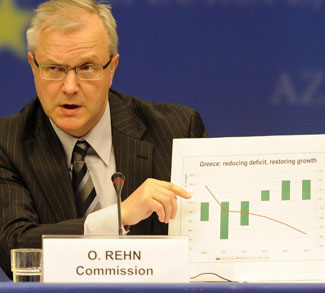FORECAST
The financial crisis that began in Greece last month and spread to other ‘PIGS countries’ (Portugal, Ireland, Greece, and Spain) is raising old doubts about the long-term viability of the EU’s monetary union.
The crisis that is currently unfolding around the Euro is one that is based almost solely on market perceptions. Doubts over the health of Greek government debt have caused bond yields and credit default swap rates to spike, which consequently has raised fears of a possible Greek default. These doubts have also widened to target other weak, deficit-ridden economies within the EU- the PIGS countries. Yields on Portuguese government bonds, for example, have recently spiked to 157 points against the benchmark German bond, a rate more than four times greater than their five-year average.
Despite last week’s temporary reprieve in Greek bond prices and the value of the Euro, this crisis is likely to play out over months if not years, negatively effecting EU growth and softening the Euro.
There is no quick remedy for the high levels of debt and deficit spending that currently plague the PIGS countries, meaning that they will continue to serve as targets for bond vigilantes well into 2010. The governments of Portugal, Spain, and Greece are currently running deficits of 9.3%, 11.4%, and 12.7% of their respective GDPs.
The Euro’s future viability as a hard global reserve currency is at stake here, and the EU bureaucracy will have its work cut out for it in rectifying the situation. Speculation over the EU’s strategy to resolve the crisis orbits two possibilities: a Germany-France-United Kingdom administered ‘bailout’ of ailing economies, and to a lesser degree the eventual issuance of a euro zone bond. Both are paths fraught with complications.
The German government will find itself hard pressed to justify spending German taxpayer money to subsidize Greek civil servants. Moreover, while a plan involving a bailout or guarantees on Greek public debt would do much to stem the tide of corrosive market speculation, it would also set a dangerous and wildly unpopular precedent within the EU, for it wouldn’t take long for larger economies within the bloc to tire of the role of lender of the last resort for countries with bloated public spending.
A euro zone bond would suffer from the same dynamic, linking bond prices and yields of responsible countries to those that are more inclined to run deficits. While talk on a euro zone bond is almost non-existent at present, if it were to ever happen it would almost certainly exist in tandem with national bond issuances.
Whatever the mode of rescue, it is a certainty that the EU will do everything possible to save the bloc’s golden calf: the viability of the Euro as a hard currency. If substantial bailouts are handed out to ailing economies, they will almost certainly be accompanied by discussions on reforming the euro zone’s Stability and Growth Pact (SGP), a toothless agreement binding member states to an annual deficit no higher than 3% of their GDP and a total public debt under 60%.
The compromise that seems to have emerged out of last Thursday’s meeting is a bailout package tied to assurances from the Greek government that the annual budget deficit will be cut by 5% over the next year. This is a bandage solution that fails to address the root problems behind the Euro financial crisis. Ultimately, some degree of deepened political integration is inevitable if the Euro is to maintain investor confidence over the long-term.
It looks like 2010 will be characterized by sovereign wealth shocks in several EU countries and, a bit further down the line, in the United States as well. Wherever bond vigilantes set their sights, bond prices will fall, yields will rise, and short-term growth projections will be adjusted downwards. The global economy as a whole will surely feel the effect, as the fallout will hit key export markets for Asian and BRIC countries as well.
SUMMARY OF EVENTS: February 8th – February 15th, 2010
NORTH AMERICA
United States
Congressman John Murtha, who said the Bush administration’s handling of the war in Iraq was based on “flawed policy wrapped in illusion” and called for a withdrawal of U.S. troops there, has died.
The United States military command for Africa, known as AFRICOM, is offering enhanced support for African Union peace and security initiatives. The commander, General William Ward, hailed Ethiopia’s decision to supply badly-needed helicopters to the joint AU/United Nations peacekeeping mission in Darfur.
WESTERN EUROPE
Greece
Greek Prime Minister George Papandreou has said he will “take any necessary measures” to reduce Greece’s deficit.
The euro held on to its overnight gains Tuesday morning in New York as speculation a bailout plan for fiscally stressed Greece is in the works boosted investor appetite for the common currency and riskier assets.
EU leaders say they are ready to act to shore up Greece’s finances and ensure stability in the eurozone – but they have made no specific promise of aid.
Ukraine
The opposition leader Viktor F. Yanukovich declared victory on Sunday in presidential elections in Ukraine, claiming what appeared to be an unlikely comeback from his humiliating defeat in the 2004 Orange Revolution, when he was shunned as a bumbling Kremlin sidekick.
United Kingdom
The foreign secretary has lost an Appeal Court bid to stop the disclosure of secret information relating to the alleged torture of a UK resident.
The U.K. Environment Agency said it will boost spending on measures to reduce flooding and coastal erosion in England and Wales by 7 percent to 745 million pounds ($1.2 billion) for the year through March 2011.
MIDDLE EAST
Yemen
Yemen’s defence ministry said this week that the government would stop its war on against rebel Houthi fighters if they were to begin complying with its six conditions.
Sana’a has dismissed threats from the so-called Al Qaeda in the Arabian Peninsula who have called for attacks on US interests worldwide.
Al-Qaeda in the Arabian Peninsula number two Said al-Shihri called for attacks against US interests “everywhere,” in an audio message released on the Internet on Monday.
The Yemeni president has announced a ceasefire in fighting against Houthi fighters in the north of the country to take effect from midnight (2100 GMT on Thursday).
Iran
Dozens of people including pro-government militia have tried to attack Italy’s embassy in Iran, Italian Foreign Minister Franco Frattini says.
Iranian government supporters and opposition protesters have rallied en masse on the 31st anniversary of the revolution that turned Iran into an Islamic Republic.
SOUTH ASIA
Pakistan
Pakistan Taliban leader Hakimullah Mehsud is dead, three Taliban sources and a government official said Tuesday.
Sri Lanka
Sri Lanka’s recently re-elected President Mahinda Rajapaksa is dissolving parliament and calling early elections, officials say.
EAST ASIA
China
Flush with cash despite the global economic downturn, China’s sovereign wealth fund quietly snapped up more than $9 billion worth of shares last year in some of the biggest American corporations, including Morgan Stanley, Bank of America and Citigroup.
China’s top court has urged judges across the country to limit the use of the death penalty against convicted individuals.
China has completed construction of 13 permanent facilities – stone tablets and lighthouses – on islands and reefs in the East China Sea, in an effort to clarify its territorial waters’ baseline in the oil-rich area.
Japan
Toyota has issued a worldwide recall for about 437,000 of its flagship Prius and other hybrid vehicles in the latest of a series of embarrassing safety problems to hit the Japanese carmaker.
AFRICA
Somalia
Reports from Somalia’s capital said new reinforcements of Al-shabab fighters have reached the city last night for a showdown with government and AMISOM troops.
The officials of Harakat Al-shabab mujahideen have Wednesday said that their fighters targeted explosions to the main base of the African Union troops (AMSIOM) in Mogadishu and killed officers, just as the spokesman of the African Union troops denied claims.
Somali government forces have killed a senior Jordanian al-Qaeda fighter, national security minister Abdullahi Mohamed Ali has told the BBC.
The Islamic administration of Al-Shabaab that controls Somalia’s southern regions of Jubba has on Sunday declared holy war on Kenya over reports that Nairobi is training Somali troops.
Zachary Fillingham is a contributor to Geopoliticalmonitor.com



